- Home
- Philip Roth
The Dying Animal Page 7
The Dying Animal Read online
Page 7
And on like that ... until ... let's see ... yes, he's stronger here. "My kids are frightened and screaming because their parents are having an argument and Daddy is so angry he is leaving the house. Do you know what it's like for me with my children when I come home at night? Do you know what it's like to hear your children cry? How could you know? And I protected you. I protected you. I tried not to believe that Mother was right. I came to your defense, I stuck up for you. I had to, you were my father. In my mind, I tried to excuse you, I tried to understand you. But the sixties? That explosion of childishness, that vulgar, mindless, collective regression, and that explains everything and excuses it all? Can't you come up with any better alibi? Seducing defenseless students, pursuing one's sexual interests at the expense of everyone else—that's so very necessary, is it? No, necessity is staying in a difficult marriage and raising a little child and meeting the responsibilities of an adult. All those years I thought Mother was exaggerating. But it wasn't exaggeration. I little knew until tonight what it was that she lived through. The pain you caused her, and for what? The burden you put on her—the burden you put on me, on a child, to be everything in the world to his mother, and for what? So you could be 'free'? I cannot bear you. I never could."
And next month he'll be back again to tell me how he can't bear me. And the month after that. And the month after that. I didn't lose him after all. His father is finally a resource. "It's me. Let me up. Ring me in!" His situation brings him no self-irony, but I believe he gets more than he lets on. He doesn't get anything? He must. He is by no means stupid. He can't be besieged forever by his childhood drama. He is? Well, perhaps so. You're probably right. He will be raw about this for the rest of his life. One of the innumerable jokes: a man of forty-two, adjoined to the thirteen-year-old boy's existence and tormented by it still. Perhaps it's just as it was at the ballgame. He's dying to break out. He's dying to get away from his mother, he's dying to go off with his father, and all he can do is vomit his heart out.
My affair with Consuela lasted for a little more than a year and a half. Only occasionally did we ever again go out for dinner or to the theater. She was too afraid of the prying press and of winding up on Page Six, and that was fine with me, because whenever I saw her I always wanted to fuck her right away and not have first to sit through some shitty play. "You know how the media are, you know what they do to people, and if I go there with you..." "Fine, don't worry," I would say agreeably, "we'll just stay home." Eventually she would stay overnight, and we would have breakfast together. We saw each other once or twice a week, and, even after the incident with the tampon, Carolyn failed to discover Consuela's existence. Still, I was never at peace about Consuela; never could I forget about the five boys she had fucked before me, two of whom turned out to be brothers, one her lover at eighteen, the other when she was twenty—Cuban brothers, Bergen County's wealthy Villareal brothers, and another cause for suffering. If it weren't for the calming influence of Carolyn and our wonderful nights together, I don't know what would have happened to me.
The agitation of having Consuela—as opposed to the agitation of not having Consuela—ended only when she received her master's degree and had a party over in New Jersey at her parents' house. Of course it was as well for both of us that it ended, but it wasn't my plan to end it, and I was bereft afterward. I was depressed off and on for nearly three years. Tormented all the while I was with her, a hundred times more tormented for having lost her. It was a bad time and it wouldn't stop. George O'Hearn was an ace. He talked me through many an evening when I found myself getting too low. And I had my piano, which was what pulled me through.
I told you that over the years I bought a lot of music, the piano literature, and so I played all the time, whenever I finished my other work. I played all thirty-two Beethoven sonatas during those years, every note of them to drive Consuela out of my thoughts. Nobody should be forced to hear a tape of that playing, which doesn't exist anyway. Some passages were in tempo, but most weren't, yet on I played regardless. Freakish, but it's what I did. With keyboard music you have the feeling of reproducing what the composers were doing, and so you're in their minds to some degree. Not in the most mysterious part, where the music originates, but still, you're not merely passively absorbing an aesthetic experience. You are, in your own clumsy way, somehow producing it yourself, and this is how I tried escaping the loss of Consuela. I played the Mozart sonatas. I played Bach's piano music. I played it, I'm familiar with it, which is a different thing from playing it well. I played Elizabethan pieces by Byrd and people like that. I played Purcell. I played Scarlatti. I have all the Scarlatti sonatas, all five hundred and fifty of them. I won't say I played all of them, but I played a lot of them. Haydn's piano music. I know it cold now. Schumann. Schubert. And this, as I told you, is on the basis of very little training. But it was an awful time, a futile time, and it was either study Beethoven and enter his mind or stay in my own mind and replay all the scenes of her I could remember—replay, worst of all, the reckless thing I did by not going to her graduation party.
But, you see, I could never figure how ordinary she was. This girl who takes her tampon out for me, and then because I don't show up at her graduation party, she's finished with me? The casualness of something so powerful ending as it did is unbelievable to me. The abruptness with which it ends, I replay that, thinking that the secret of the abruptness is that Consuela didn't want it to go on. Why? Because she didn't desire me, never desired me, because she experimented with me, really, to see how overwhelming her breasts could be. But she herself was never getting what she wanted. She was getting that from the Villareal brothers. Of course. There they all were at the party, pressing in on her, surrounding her, dark, handsome, muscular, mannerly, young, and she realized, What am I doing with this old man? So I was right all along—and therefore it was right for it to end. She went as far as she wanted to go. All I could have done by forging ahead was to arrange more torture for myself. The smartest thing I did was not to show up there. Because I had been yielding and yielding in ways that I didn't understand. The longing never disappeared even while I had her. The primary emotion, as I've said, was longing. It's still longing. There's no relief from the longing and my sense of myself as a supplicant. There it is: you have it when you're with her and you have it when you're without her. So who ended it? Did I end it by not going to the party, or did she end it by seizing upon my not going to the party? This is the endless debate I had and why, to stop my mind from revolving around the loss of Consuela—to stop myself from falsely particularizing this one event, the party, as the clue to everything I'd mismanaged—I often had to get up in the middle of the night and play the piano until dawn.
All that had happened was that she invited me to Jersey to celebrate her getting her degree and I had to say yes, but as I was driving across the bridge, I thought, Her parents will be there, her grandparents, the Cuban relatives, all the old childhood friends will be there, those brothers will be there, and I will be introduced as the teacher who is on television. And it was just too silly after a year and a half for me to pretend I was nothing to this young woman but a kindly mentor, especially in the presence of those fucking Villareals. I was too old for this nonsense, so I stopped on the Jersey side of the bridge and phoned her and told her my car had broken down and I couldn't come. A transparent lie—I had a Porsche not two years old—and so that very night, from New Jersey, she faxed me a letter on the family fax machine, not the most explosive letter I have ever received from anyone, but nonetheless, I could never have imagined Consuela uncontrollable like this.
But I could never imagine Consuela altogether. What more didn't I know about her because of being blinded by my obsession? Shouting at me in the letter: "You're always playing the wise old man who knows everything." Shouting: "I saw you just this morning on television, playing the role of the one who always knows better, knowing what is good culture and what is bad culture, knowing what people should read and what they sh
ouldn't read, knowing all about music and all about art, and then, to celebrate this important moment in my life, I have a party, I want to have a wonderful party, I want to have you around, you who mean everything to me, and you're not there." And I had already sent her a present, sent flowers, but she was so furious, so angry..."Mr. Arrogant Intellectual Critic, the great authority on everything, teaching everybody what to think and setting everyone right! Me da asco!"
That's how she ended it. Never before, not even affectionately, had Consuela availed herself of Spanish with me. Me da asco. Ordinary idiom meaning, "It makes me sick."
This is all six and a half years ago. The strange thing was that three months later I got a postcard from her, from some Third World country with a first-class resort—Belize, Honduras, some such place—and it was completely friendly. Then six months later she phoned me. She was applying for a job in advertising, the kind of job, she said, I would hate her for, but would I write a letter of recommendation anyway? As her former professor. Which I wrote. Then I got a postcard (a Modigliani nude from the Modern) saying she got the job and that she was very happy. And then nothing more from her. One night I found her name in a new Manhattan phone book, the address of an apartment her father must have bought for her on the Upper East Side. But going back was a bad idea and I didn't try.
George, for one, wouldn't let me. George O'Hearn, though fifteen years my junior, was my worldly confessor. He was the friend closest to me during the year and a half I was with Consuela, and only afterward did he tell me how concerned he'd been, how he'd kept a careful watch over me as I denuded myself of my realism, my pragmatism, my cynicism and thought of nothing but losing her. He's the one who wouldn't let me answer her postcard, which I was dying to do, which I believed I was being invited to do by the cylindrical stalk of a waist, the wide pelvic span, and the gently curving thighs, by the patch of flame that is the hair that marks the spot where she is forked—by the trademark Modigliani nude, the accessible, elongated dream girl he ritualistically painted and that Consuela had chosen to send, so immodestly, through the U.S. mail. A nude whose breasts, full and canting a bit to the side, might well have been modeled on her own. A nude represented with her eyes closed, defended, like Consuela, by nothing other than her erotic power, at once, like Consuela, elemental and elegant. A golden-skinned nude inexplicably asleep over a velvety black abyss that, in my mood, I associated with the grave. One long, undulating line, she lies there awaiting you, still as death.
George hadn't even wanted me to write the recommendation for the job. He said, "You'll always be powerless with this girl. You'll never be in charge. There's something there," George told me, "that makes you crazy and always will. If you don't cut the connection for good, in the end that something will destroy you. You're no longer merely answering a natural need with her. This is the pathology in its purest form. Look," he told me, "see it as a critic, see it from a professional point of view. You violated the law of aesthetic distance. You sentimentalized the aesthetic experience with this girl—you personalized it, you sentimentalized it, and you lost the sense of separation essential to your enjoyment. Do you know when that happened? The night she took the tampon out. The necessary aesthetic separation collapsed not while you watched her bleeding—that was all right, that was fine—but when you couldn't restrain yourself and went down on your knees. And what the hell compelled you? What lies behind the comedy of this Cuban girl taking a guy like you, the professor of desire, to the mat? Drinking her blood? I'd say that constituted the abandonment of an independent critical position, Dave. Worship me, she says, worship the mystery of the bleeding goddess, and you do it. You stop at nothing. You lick it. You consume it. You digest it. She penetrates you. What next, David? A glass of her urine? How long before you would have begged her for feces? I'm not against it because it's unhygienic. I'm not against it because it's disgusting. I'm against it because it's falling in love. The only obsession everyone wants: 'love.' People think that in falling in love they make themselves whole? The Platonic union of souls? I think otherwise. I think you're whole before you begin. And the love fractures you. You're whole, and then you're cracked open. She was a foreign body introduced into your wholeness. And for a year and a half you struggled to incorporate it. But you'll never be whole until you expel it. You either get rid of it or incorporate it through self-distortion. And that's what you did and what drove you mad."
Hard to sanction those words, and not only because of George's mythopoeticizing turn of mind; just hard to believe in the disastrous potential of a character so seemingly unintimidating as family-bound, protected, suburban Consuela. George wouldn't let up. "Attachment is ruinous and your enemy. Joseph Conrad: He who forms a tie is lost. That you should sit there looking like you do is absurd. You tasted it. Isn't that enough? Of what do you ever get more than a taste? That's all we're given in life, that's all we're given of life. A taste. There is no more."
George was right, of course, and only repeating to me what I know. He who forms a tie is lost, attachment is my enemy, so I employed what Casanova called "the schoolboy's remedy"—I masturbated instead. I would imagine myself sitting at my piano while she stood naked beside me. We had once enacted just such a tableau in the flesh, so I was as much remembering as imagining. I had asked her if she would take off her clothes and let me look at her while I played the Mozart Sonata in C Minor, and she obliged. I don't know that I played it any better than I ordinarily did, but that was never the point. In another recurring fantasy, I am telling her, "This is a metronome. The little light flashes and it makes a periodic noise. That's all it does. You adjust the pace to what you want. Not only amateurs like me but professionals, even great concert pianists, have the problem of what's called rushing." Once again, I envision her standing by the piano with her clothes at her feet, as on the night when, fully dressed, I played the C Minor Sonata, serenading her nudity with the slow movement. (Sometimes she would come to me in a dream identified, like a spy, only as "K. 457.") "This is a quartz metronome," I say. "It's not the triangular-shaped thing you may have seen, with a pendulum, where the pendulum has a little weight on it, and the numbers are there. The numbers are the same as on a pendulum," and when she advances to examine the dial, her breasts pitch forward to cover my mouth and to stifle, momentarily, the pedagogy—the pedagogy that with Consuela is my greatest power. My only power.
"They're standard numbers," I tell her. "If you turn this to sixty, the beats will be seconds. Yes, like a heartbeat. Let me feel the tap of your heartbeat through the tip of my tongue." This she allows to happen, as she lets everything between us happen—without comment, almost without complicity. I tell her, "Actually, before it was invented about 1812—the old one, that is—there are no metronome markings on music. What they did in the general treatises about tempo was to suggest that you employ the beat of the pulse as a certain kind of allegro. They'd say, 'Take your pulse and think of the tempo as that.' Let me take your pulse with the head of my prick. Sit on my prick, Consuela, and we'll play with time. Ah, it's not a fast allegro, is it? Not at all. Now, there's no Mozart piece with metronome markings, and why, why is that so? You remember when Mozart died..." But here I have my orgasm, the fantasy lesson is ended, and, for the moment, I am sick no longer with desire. Isn't that Yeats? "Consume my heart away; sick with desire / And fastened to a dying animal / It knows not what it is." Yeats. Yes. "Caught in that sensual music," and so on.
I played Beethoven and I masturbated. I played Mozart and I masturbated. I played Haydn, Schumann, Schubert, and masturbated with her image in mind. Because I could not forget the breasts, the ripe breasts, the nipples, and the way she could drape her breasts over my cock and fondle me like that. Another detail. A last detail and I'll stop. I am becoming a bit technical, but this is important. This was the touch that made Consuela a masterpiece of volupté. She's one of the few women I've known who come by pushing out the vulva, by involuntarily pushing it out like a bivalve's soft, unsegmented, bubbling-fort
h body. It took me by surprise the first time. You feel it and you get a sense of this other-world fauna, something from the sea. As though it were related to the oyster or the octopus or the squid, a creature from miles down and eons back. Normally you see the vagina and you can open it with your hands, but in her case it bloomed open, the cunt on its own emerging from its hiding place. The inner lips get extruded outward, swell outward, and it's very arousing, that slimy, silky swollenness, stimulating to touch and stimulating to see. The secret ecstatically exposed. Schiele would have given his eyeteeth to paint it. Picasso would have turned it into a guitar.

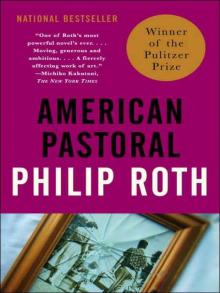 American Pastoral
American Pastoral The plot against America
The plot against America The Human Stain
The Human Stain Nemesis n-4
Nemesis n-4 Sabbath’s Theater
Sabbath’s Theater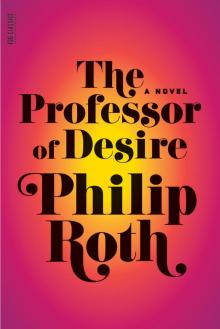 The Professor of Desire
The Professor of Desire Our Gang
Our Gang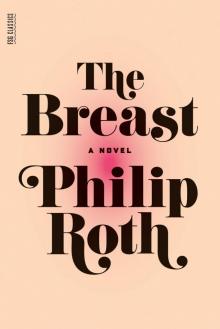 The Breast
The Breast Operation Shylock
Operation Shylock The Dying Animal
The Dying Animal Letting Go
Letting Go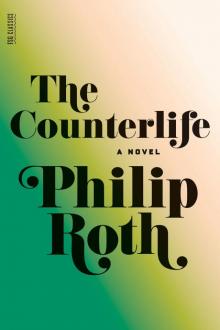 The Counterlife
The Counterlife Everyman
Everyman Nemesis
Nemesis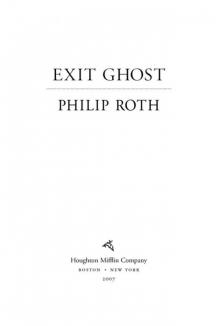 Exit Ghost
Exit Ghost Portnoy's Complaint
Portnoy's Complaint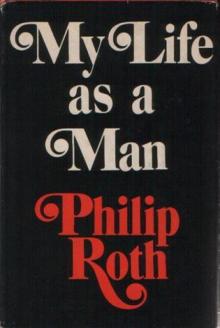 My Life as a Man
My Life as a Man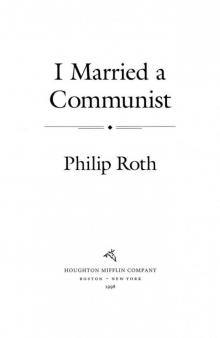 I Married a Communist
I Married a Communist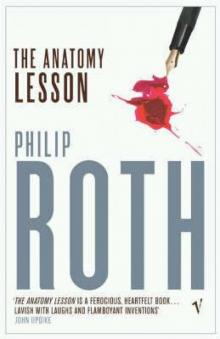 The Anatomy Lesson
The Anatomy Lesson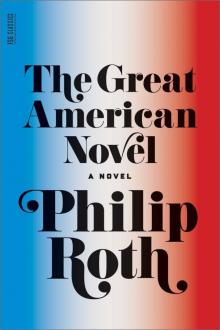 The Great American Novel
The Great American Novel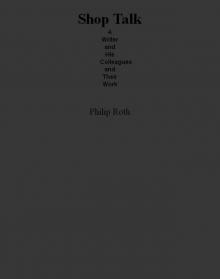 Shop Talk
Shop Talk The Humbling
The Humbling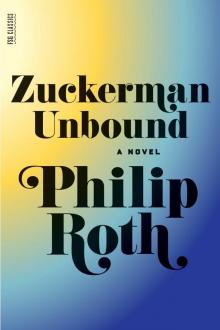 Zuckerman Unbound
Zuckerman Unbound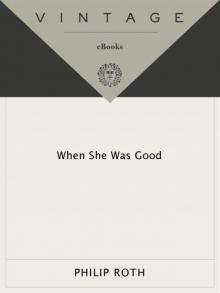 When She Was Good
When She Was Good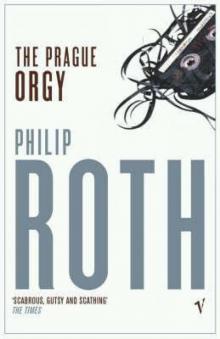 The Prague Orgy
The Prague Orgy American Pastoral (Nathan Zuckerman)
American Pastoral (Nathan Zuckerman) Goodbye, Columbus
Goodbye, Columbus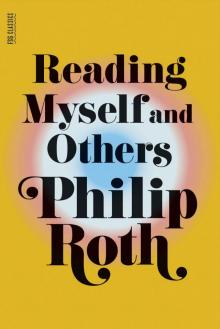 Reading Myself and Others
Reading Myself and Others